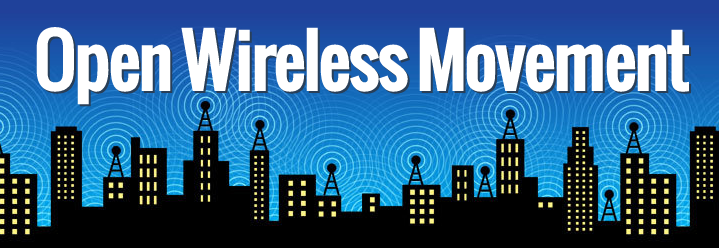Last Thursday I went to the 5 Minutes of Fame talks at Noisebridge Hackerspace. The talks ranged from how Winamp is pretty awesome to reading brain waves. The talk that caught my attention, however, was Adi Kamdar's presentation about the Electronic Frontier Foundations's new campaign, The Open Wireless Movement. The Open Wireless Movement's purpose is to encourage folks to open their personal networks to the public. The EFF partnered with some great organizations to get this off the ground.
But why should we do this? Haven't people tried similar things before, and how will this campaign be any different?
First, open wireless is invaluable during emergencies, allowing first aid and fast communication between government officials and helpful citizens. It was especially helpful during the Minneapolis I-35 bridge collapse, according to the FCC.
Secondly, it's a basic courtesy, as Peter Eckersley of the EFF says,
Most of us have had the experience of tremendous inconvenience because of a lack of Internet access…Finding yourself in one of these binds is a bit like finding yourself parched and thirsty while everyone around you is sipping from nice tall glasses of iced water, or finding yourself cold and drenched in a rain storm because nobody will let you under their umbrella. (Read the rest of Eckersley’s arguments for open wireless here.)
Still not convinced? Here are more reasons for why you should share your network:
- It is less wasteful. Most people don't use all of their bandwidth, so why not share what you aren't using?
- Having access to the Internet is a basic human right according to the UN. Access to the Internet falls under Article 19 of the International Covenant of Civil and Political Rights.
- More people with access to the Internet, and it's resources, means a better world for everyone through more sharing of knowledge and physical assets (through collaborative consumption).
- It isn't any less secure than closed access wireless; the tools to protect your computer already exist. Check out some of the tools at our disposal here.
- We can ditch the overpriced phone companies and switch to using wifi networks for mobile telephony, and use cell networks only when there's no wifi. This could save us both money and energy. Check out Republic Wireless, one of the first wifi mobile phone carriers. It's only $19 a month for unlimited voice and data.
Worried about losing all of your bandwidth to freeloaders and torrenting teenagers? (Get off my lawn!) You can still share your bandwidth, without losing any speed or functionality. Most routers allow you to set up a guest network, so that you can share without going thirsty, or getting caught out in the rain without an umbrella because you gave it away. Instructions on sharing your bandwidth can be found here. Note that these are instructions for individual routers. Just pick your router from the list and follow the instructions.
Similar efforts have been tried before without much luck. However, unlike previous attempts, this movement isn't dependent on new software or hardware to work. Wireless access points are already everywhere. And almost anyone with a home wifi network can participate. If you understand how your home wifi works, even on the most rudimentary level, you can participate in this movement. The only thing the Open Wireless Movement needs now is you.









